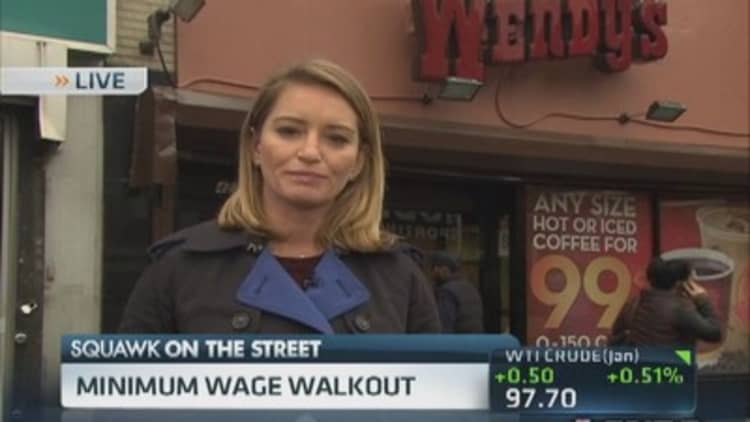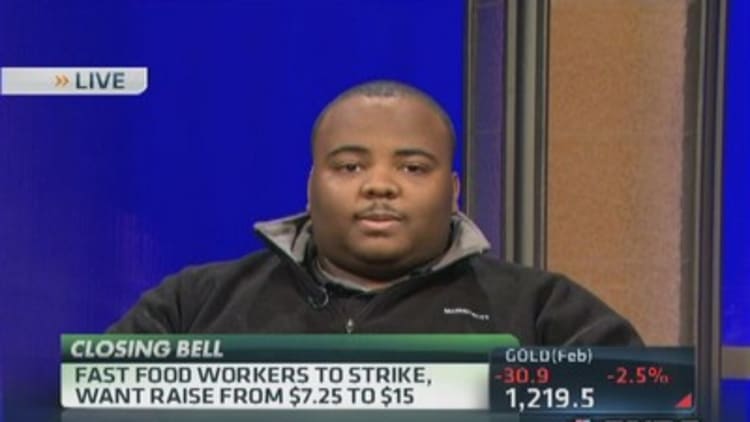
Fast food workers from 100 cities across the U.S. are expected to stage a mass strike on Thursday, marking the largest ever push for higher wages.
Workers in the industry are demanding that their wages be raised to $15 per hour from the current level of $7.25, the federal minimum wage, a move that is proving divisive in the country's service industry.
President Barack Obama signalled last month that he supported raising the minimum wage and said he would back a Senate initiative to raise the minimum level of pay to $10.10 per hour. Again in a speech in Washington on Wednesday, Obama renewed that call saying that economic inequality was "the defining challenge of our time."
The strike has been organized by the labor unions, Democrats and other workers' advocacy groups across the U.S. to draw attention to the challenges of living on such a wage, which amounts to around $15,000 a year, although it is not known exactly how many workers will strike.
Thursday's strike follows coordinated labor union action in August in which 60 cities participated and cities like California have already raised their minimum wages with Seattle, Chicago and New York set to follow suit.
(Read more: Fast-food strike gets supersized over wages)

The strike has proved divisive. The industry's lobbying group, the National Restaurant Association, dismissed the strength of the movement for higher wages. The association's executive vice-president of policy and government affairs, Scott Defife, downplayed the potential impact of the strikes, saying "relatively few workers have participated in the past."
Rather, Defife said in a statement to CNBC that "these demonstrations are a coordinated PR campaign engineered by national labor groups where the vast majority of participants are activists and paid demonstrators."
"The U.S. is in the middle of one of the biggest pushes that I've ever seen in my 20 years in the field," Paul Sonn, General Counsel at the National Employment Law Project, an advocacy group for lower-wage workers, told CNBC on Thursday.
(Read more: Earn minimum wage? It'll take this long to afford a Big Mac)
Echoing President Obama's comments this week that the issue over low pay was the "defining challenge of our time,"
Sonn said the issue was crucially important to the wider U.S. economy as "the majority of jobs our economy is creating are now in these low-paying fields like restaurant and retail."
"These aren't teen jobs anymore – now tens of millions of adult Americans spend their time cycling through these jobs and, at $9 an hour, they're just not sustainable."

Fast food workers wanted to negotiate a roadmap to higher wages in the U.S., Sonn said, and to "sit down with the industry" to transition to a "higher wage, higher productivity model."
Although higher wages would require "modest price adjustments" in the fast food retail price and a reduction in fees for franchisees -- which run 75 percent of fast food businesses in the U.S., according to the International Franchise Association -- to allow them to pay higher wages, Sonn insisted that fast food firms would retain more workers and save on the "major costs" of having to recruit and train staff.
(Read more: Minimum wage hike: Just what the economy ordered?)
Higher wages are a moot point for governments and central banks around the world in an age of central bank stimulus. Concerns over the inflationary effect of quantitative easing in the U.S. and U.K. have been a key issue for policymakers looking to stimulate the economy and liquidity without causing price increases.
Unemployment too is a key challenge facing the U.S., with the jobless rate at 7.2 percent in October, still above the U.S. Federal Reserve's 6.5 percent target that could prompt it to start reducing its stimulus program.
Against such a backdrop, there could be widespread reluctance to raise wages when millions are desperate for work and employers are facing reduced profit margins.
While inflation is "fairly benign" at the moment and below central bank target in the U.S. and U.K., one market analyst told CNBC, a jump in the minimum wage could prompt concerns within the Federal Reserve and consequences down the line.
"Something like this [a higher minimum wage], if I was at the Federal Reserve, would start to get me worried – maybe not in 2014, but beyond that," Charles Diebel, head of Market Strategy at Lloyds Bank Commercial Banking told CNBC on Thursday.
"If you start to get this big jump in wages maybe that would just lower corporate profit margins and the companies can absorb it and maybe that doesn't alter the longer-term inflationary bias. But one would think that if the amount of income that the people who work in these places goes up, they are going to spend more of it."
"Although that sounds great as it increases economic activity, it does increase the inflationary risk. That, to me, is the real issue here."
- By CNBC's Holly Ellyatt, follow her on Twitter @HollyEllyatt


